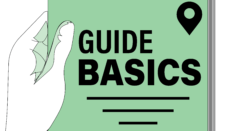We have already mentioned on other occasions how many spelling mistakes are made, either because we do not know how certain words are written or if we have some doubts when writing them and finally we opt for the wrong one, such as not knowing the use of the rules of the letters.

Some of the biggest spelling errors that we can find is in the use of “v” and “b”, since although they are not pronounced the same, in some places, due to their own accents, they can end up pronouncing them differently. similar, which at the time of writing can lead us to confusion.
If you have some doubts and you don’t know how to write I was or was, then keep reading this article from doncomos.com where we are going to teach you everything you need to know about this word as well as its correct spelling.
It is essential to know the different rules for the use of the letters, in this case, the confusion between I was and I was can be found in not knowing whether to use the “v” or the “b”, and therefore it can lead us to commit certain misspellings. We can also find common mistakes using these letters in many other words, such as polvo or polbo, hibernar or hibernar, vasco or basco, etc. but for now we are going to concentrate on explaining how they are written I was or I was.
I was
I was written with “b” is misspelled, so we cannot use this word in any way unless you want to show your lack of culture. We must remember that, although estube with “b” is seen more and more frequently on the internet, it is badly written, and we must not let ourselves be influenced by these errors.
In this case, writing estube with “b” would be violating an important spelling rule that says that all those verb tenses whose infinitives do not contain either “b” or “v” must be written with “v”.
If we look at this case, estube corresponds to an (incorrect) conjugation of the verb to be, which is a verb that does not contain either “v” or “b”, therefore estube, should be written with “v”.
However, there is an exception to this spelling rule. And it is that the imperfect past tense of the indicative will always be written with “b”. such is the case of “were” and we will never write “were”.
Some examples of WRONG use of “I was” are:
Yesterday I was at the doctor for two hours,
Today I was at Pedro’s house.
I have been
Now that we know that I was with “b” is the wrong way to write this conjugation, it is logical to know that the correct way will be to write it with “v”, that is, I was.
“I was” by definition is the conjugation in the first person of the singular of the simple past tense of the indicative of the verb to be.
Some examples of use of this word are:
Today I was looking for the paper, but I couldn’t find it.
I was not at home at that time.
I was not at my best during the conference.
The verb to be is one of the fundamental verbs of the Spanish language, therefore it is essential that we know it perfectly, so now we will see the meanings of the verb to be. (The meaning of I was will be the same only as in the past and in the first person).
Exist or be in a certain place (both thing and person)
For example: She was in the kitchen all afternoon.
To be found at a certain moment in time.
For example: We are at the end of the month.
Indicate approach to a certain action.
For example: I’m scared to death.
That a person feels a certain way.
For example: I am very confused, I don’t know what to do now.
Point out the price or cost of something.
For example: These clothes were half price.
Suffering from any illness or disease.
For example: I have chicken pox, so I can’t go to school.
Do some job temporarily.
For example: María is a cashier while her partner is still on leave.
Practice some activity.
For example: I am playing the stock market to earn some extra money.
Living with another person or persons
For example: I am with my sister and her husband until they repair my apartment.
Synonyms of the verb to be
Synonyms are words that have the same meaning, so they can be used interchangeably in certain sentences. The synonyms that we can use of the verb to be are:
With the meaning of meeting: to locate, to find, to locate, to remain, to meet.
With the meaning of inhabit: live, dwell, inhabit, reside.
With the meaning of locating: staying, settling down, meeting.
We hope that your doubts about how to write I was or I was correctly have been cleared up and that you will not make more spelling mistakes in relation to these words. Remember that I was always written with a “v”, no matter how you see it on certain websites on the internet.
